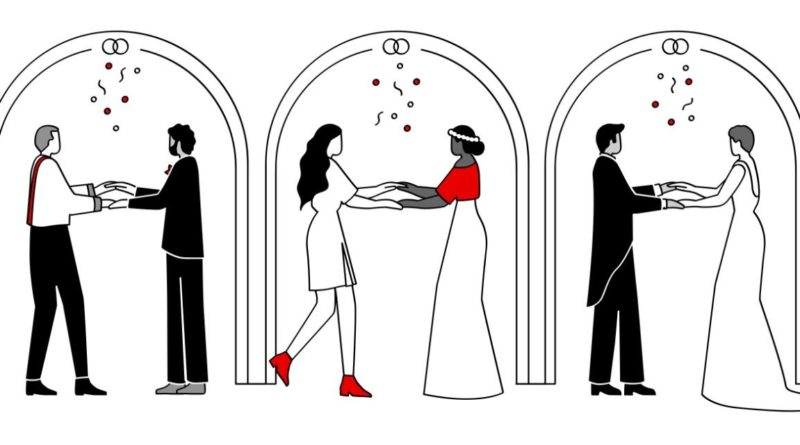Same-sex marriage

Marriage for same-sex partners has been a widely discussed matter in Czech society for the past years. Legalization of this type of marriage is especially interesting given the situation outside of the Czech Republic, where opinions differ substantially. This post aims to outline the situation of marriage for same-sex partners in the Czech Republic with a wider context in Europe. Then the essay will briefly elaborate on the progress in this aspect in the Czech Republic over the years. Another area that will be discussed will be the current standpoint of politicians and the involvement of some companies like RegioJet.
Firstly, the Czech Republic could be historically speaking considered a liberal given that homosexuality has been legal since 1962. For a better context, it is worth mentioning that many countries in western Europe legalized homosexuality fairly later – western Germany in 1994, the UK in 1967, and Spain in 19781. The age of consent (15 years old) has been equalized in 1990. One of the particular situations in the progress of LGBTQ+ rights in the Czech Republic took place in 2006 when despite the veto of former president Václav Klaus, same-sex unions have been legalized during Paroubek’s government. Though at this point, the legal situation of the LGBTQ+ community was already behind western Europe. The Netherlands legalized same-sex marriage (as the first country ever) in 2001, Spain in 2005, and same-sex unions have been prevalent in Europe since 1989 when first legalized by Denmark. In Central Europe, the progress was slower as Germany adopted the same sex in 2017, and Austria in 2019. Same-sex unions are currently not a very frequent phenomenon as the majority of the countries that at some point had same-sex unions already adopted same-sex marriage (Denmark since 1989) as shown in Figure 1.

In recent years, some countries like Germany or Austria progressed in equal rights for the LGBTQ+ community. Meanwhile, some other central European countries like Poland or Hungary stepped back. The majority of Polish society is affiliated with Catholic Church holding a conservative stance towards the LGBTQ+ community. Accordingly, the political scene is rather conservative. Since 2015, when the political party Law and Justice (PiS) took power, no legal progress has been done. The party accused progress in this area of ‘western LGBT ideology’ and in 2020 100 municipalities in the more conservative and rural southeast of the country claimed themselves as ‘LGBT-free zones’ as shown in Figure 2.
Hungary, unlike Poland, adopted same-sex unions in 2009. Since then, there has been no progress toward same-sex marriage. As a matter of fact, same-sex marriage is prohibited, just like in Poland, by the constitution. Hungarian conservative government Fidesz led by Viktor Orban in June 2021 adopted anti-LGBT law on ‘homosexual and transexual propaganda’. The law was inspired by the similar legislation adopted in Russia’s anti-gay law2. 17 members of the European Union (EU) condemned the Hungarian legislation adoption. Differences among central European countries clearly show two distinct tendencies in LGBTQ+ rights progress.
The Czech Republic is unique as it stands on the very verge of these two tendencies. There are not yet tangible trends of LGBTQ+ rights restriction as in Hungary or Poland, nor LGBTQ+ rights progress as in Austria or Germany. There has been no legal change regarding same-sex couples in the past 16 years which does not mean that there have not been social changes or lobbying for either party. When it comes to the social aspect, same-sex marriage has been in 2006 supported by 52% of the Czech population3 whereas, in 2020, the support was 62%4. A similar shift in the attitude of the Czech society can be seen in the perception of acceptability5 of homosexuality and so on. It could be expected that a similar shift of attitude would manifest itself in the political reality which is not the case since the last legal shift of same-sex couples was done in 2006. This clearly illustrates the uniqueness of the Czech situation, as there has not been any political change despite the dynamic situation in the region and the shift of the Czech society.
Nonetheless, there are activistic groups that support same-sex marriage and that are trying to pursue politicians to adopt the same legislation embodying the strict definition of marriage into the constitution. This change in the constitution’s explicit definition of marriage between a man and a woman would make any future changes harder to achieve. The group trying to make these changes happen is called ‘Aliance pro rodinu’. Contrary to that, the organization ‘Jsme fér’ lobbied for the opposing law amendment not in the constitution, but as a regular law. Both propositions are currently in the parliament and yet the parliament has not decided on them.
Jsme fér is supported by some companies supporting this law amendment6. Those companies also promise to make the environment such that their queer employees would feel welcomed and not discriminated against. One of these companies is RegioJet which agreed on recording an interview about this matter. The 15-minute-long interview held in the Czech language has been conducted with Chief Operations Officer Jiří Jahelka.
In the interview, it has been expressed by the Chief Operations Officer that the company has been friendly towards its LGBTQ+ employees even before the start of the initiative. Despite this, he notices that in the past 5 years, the employees started to be more open about their LGBTQ+ identity. It has been also said that there has been no case of any letter of complaint from the customers and cases of vulgar customers are rare. Therefore, the Chief Operations Officer believes that the support of Jsme Fér is rather symbolic. Therefore, it seems the change in public attitude towards the LGBTQ+ community is progressing continually on its own as is the philosophy of the companies. Hence, companies‘ support of Jsme Fér has a symbolic meaning.
The future of same-sex marriage in the Czech Republic is unclear. The new government elected 1 year back holds rather conservative views and does not seem very interested in broadening the rights of the LGBTQ+ community in this aspect. Furthermore, despite the support of the Czech society towards same-sex marriages, the society does not seem to be very interested, which results in political preferences that do not reflect this attitude whatsoever.
Sources
[2] https://www.opendemocracy.net/en/5050/russia-gay-propaganda-law-amendments-explainer/
[4] https://www.expats.cz/czech-news/article/most-czechs-67-support-same-sex-marriage-says-new-poll




